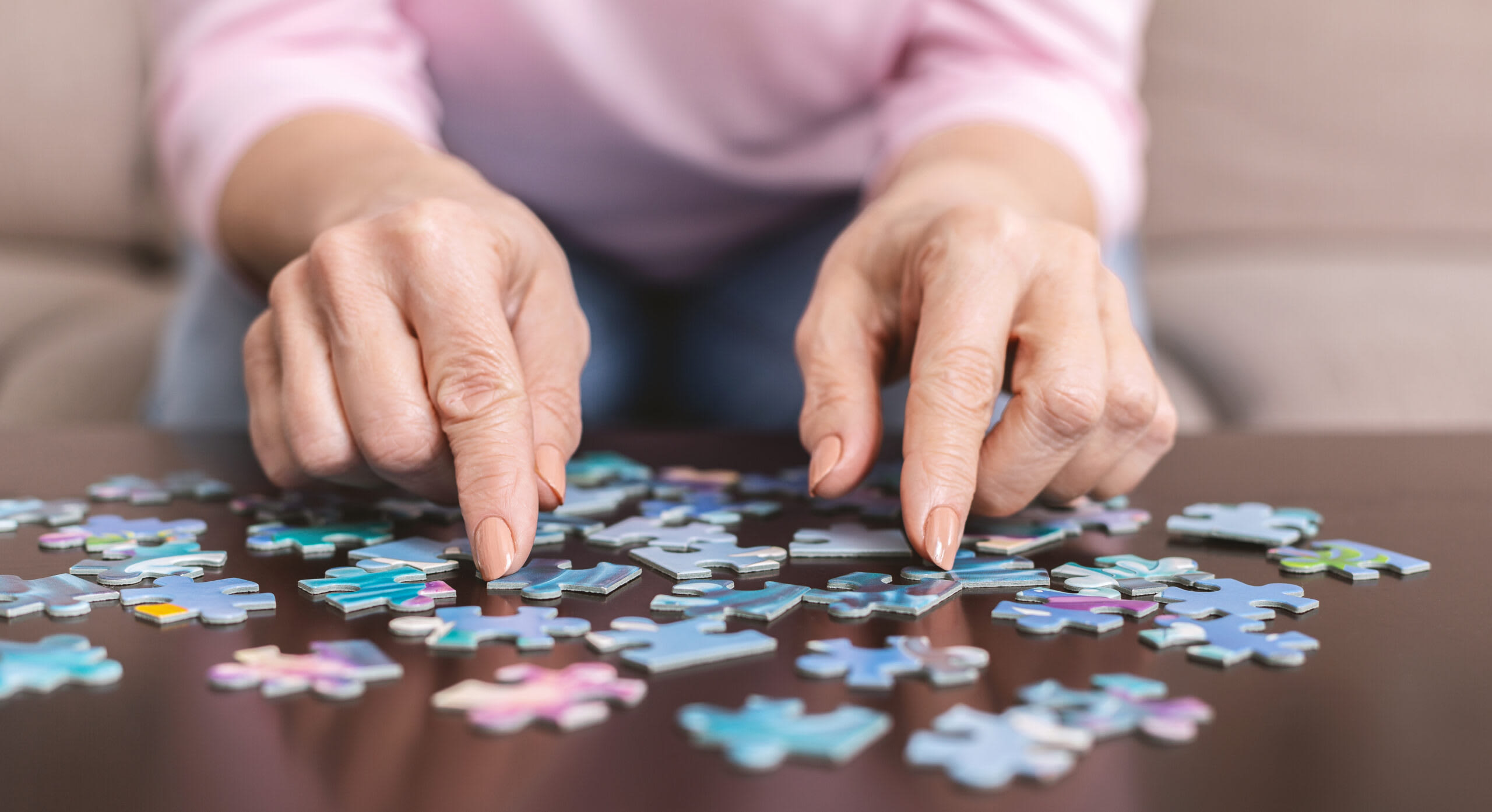
5 Best Puzzles for Dementia Patients

Puzzles are an excellent way for seniors with dementia to strengthen cognition, reduce agitation, and feel accomplished. Because dementia is a general term for a decline in cognitive function, rather than a single disease, seniors may have a combination of symptoms that need support in addition to memory concerns. Not only can puzzles help seniors cope with these symptoms, but they can also be a fun way for loved ones to spend time together.
Is memory care the right fit?
Let our free assessment guide you to the best senior living options, tailored to your needs.
Key Takeaways
- Puzzles help seniors manage stress. Problem-solving can empower your loved one and help them cope with the frustration that comes with memory challenges.
- Puzzles are great brain exercises. They can improve cognition and potentially delay the progression of dementia symptoms.
- Different types of puzzles can support your loved one’s mental health. These include jigsaw puzzles with under 100 pieces, tangram, dominoes, and more.
- Keep your loved one engaged by meeting their needs. Create a calm environment to reduce frustration, and offer a variety of puzzles that aren’t overly challenging.
4 benefits of puzzles for seniors with dementia
Puzzles and games, along with other stimulating activities, can increase cognitive scores in seniors with dementia.[01] While it’s uncertain whether these benefits are due to the activity itself or to the aspect of social interaction working on puzzles provides, the positive effects are nevertheless noticeable.
Here are several wonderful benefits of puzzles for adults with dementia.
1. Puzzles can offer a sense of accomplishment
Like anyone else, seniors with dementia can benefit from having a sense of purpose, overcoming a challenge, and achieving a feeling of accomplishment. Puzzles are a great activity that combines fun and mental stimulation.
2. Puzzles are an excellent way to manage stress
The confusion and memory loss associated with dementia can be frustrating, and it may lead to agitation and irritability. Puzzles can be a soothing activity, much like meditation. By keeping your loved one focused on a positive, problem-solving activity, you can help them feel confident and empowered.
3. Puzzles exercise the brain
The brain is like any other part of the body — it needs exercise in order to keep functioning properly. Actively spending time problem-solving can boost cognitive function and has been shown to slow the progression of dementia.[02]
4. Puzzles are a way to foster social connection
Your loved one with dementia may have a hard time holding a conversation or following the plot of a movie. Not only is this frustrating for your parent, but it may be hard on you as their caregiver. It may be difficult to be patient, and you may also experience grief seeing that your loved one isn’t able to communicate in the way they used to.
Solving a puzzle together can be a more peaceful way to connect. The tangible components of the puzzle can act as cues that help your loved one stay grounded and remember what they’re working on.
5 great puzzles for seniors with dementia
Puzzles are popular with a variety of age groups. It’s easy to see why — puzzles are not only good for young, developing brains, but they can benefit people of all ages. Plus, they’re a lot of fun, and there are many types to choose from.
When choosing puzzles for an adult with dementia, it’s important to find ones that will pose a challenge but not be so difficult that they’ll cause frustration or discouragement.
Take a look at these top five puzzles for seniors with dementia.

Is memory care the right fit?
Let our free assessment guide you to the best senior living options, tailored to your needs.
1. Jigsaw puzzles
A classic and fun choice, jigsaw puzzles have been found to improve cognitive abilities. They can help with visual-spatial processing, episodic memory, and regulation of emotions.[03]
You can add a thoughtful touch by choosing a jigsaw puzzle that will best appeal to your loved one’s taste and interests. Look for puzzles with images of an art piece, landmark, or animal that holds meaning for them. Whatever you choose, you’ll want to pick a puzzle that isn’t too overwhelming.
Depending on how far your loved one’s dementia has progressed, their skill level may vary. Puzzles designed for seniors with dementia are usually under 100 pieces. There are also puzzles designed for seniors with advanced dementia, some of which may only have 5-10 large pieces.
2. Customized jigsaw puzzles
In addition to all the benefits and appeal of a classic jigsaw, you can add an extra personal touch by gifting a customized jigsaw puzzle. Choose a photograph that prompts your loved one’s memories and encourages reminiscence. A picture of the grandkids, your loved one’s wedding photograph, or a family picture from a reunion or holiday are just a few of the endless possibilities.
3. Word games and puzzle books
There are many different types of word games and word puzzles to choose from. Letter scrambles, word searches, and crossword puzzles are excellent cognitive exercises. Not only are word puzzles a lot of fun, but they also help boost recall and assist in memory retention.
Many puzzle books will also include other types of games:
- Mazes
- Riddles
- Brain teasers
- Spot-the-difference pictures
These games encourage problem-solving, logical reasoning, and focus. You can find large-print word puzzle books with a variety of puzzles to keep things fun and interesting for your loved one.
4. Tangram puzzles
Tangram is an ancient Chinese puzzle with seven geometric pieces that fit together into a square. A tangram puzzle usually includes pictures of multiple arrangements that can be made from the pieces in order to resemble animals or other familiar objects. Arranging the pieces with only a silhouette as a guide is an excellent exercise in reasoning, spatial awareness, and problem-solving.
5. Dominoes
There are a number of ways to interact with dominoes, which can be a fun and interactive activity for the whole family to participate in with your loved one:
- Use them as a puzzle by matching ends with the same number of dots.
- Set them up on their sides in winding trails, and then knock them over in one satisfying swoop.
- Play puzzle-like domino games, such as Crow’s Feet, which involves connecting pieces by their common numbers and creating trails that branch off.
How to get the most out of puzzle time
When planning any activity for your senior loved one, make sure to pay attention to their needs. It’s important to find a puzzle that appropriately matches their skills and to build positive associations through environment, success, and variety. Here are a few more tips to make the most of puzzle time.
1. Set the scene
A tidy, uncluttered surface with space to spread out the puzzle pieces will make for a more soothing activity time. Be sure to create an environment that’s stimulating but not overwhelming.
Brew up a cup of coffee or tea, pop a bowl of popcorn, and light a softly scented candle. If it’s not too distracting, play some gentle music. If the chosen activity is a jigsaw, keep the box or image within access, so your loved one can reference it as needed.
2. Quit while it’s still fun
Make sure to take a break before your loved one becomes listless, frustrated, or overly tired. Come back to the puzzle later or even put it away until tomorrow. This helps ensure the activity doesn’t become a source of additional stress.
A useful method is to set aside a half hour for puzzling. You can adjust the time based on your loved one’s interest level. Once the time is up, move on to another activity, like coloring or taking a walk.
3. Mix it up
Keep a few different jigsaw scenes and other types of puzzles on hand. As the puzzles become familiar, they’ll be useful for memory recall. However, having a variety will offer the best engagement and mental stimulation.
A puzzle subscription service is another way to introduce variety and keep your loved one interested in puzzle time. You can find subscriptions created specifically for seniors with dementia, and puzzles are delivered either seasonally or monthly.

Memory care questions? Get expert help
Tell us your care needs to receive personalized guidance from our advisors.
Support for you and your senior loved one
Puzzles are a positive way to interact with your aging loved one while helping maintain their brain health. They are just one of many supportive memory care activities.
There may come a time when you need to seek additional help caring for your loved one with long-term memory care or in-home care. Contact a free Senior Living Advisor at A Place for Mom to learn more and find out what’s right for your family.
Schultz, S. A., Larson, J., Oh, J., Koscik, R., Dowling, M. N., Gallagher, C. L., Carlsson, C. M., Rowley, H. A., Bendlin, B. B., Asthana, S., Hermann, B. P., Johnson, S. C., Sager, M., LaRue, A., & Okonkwo, O. C. (2015, December). Participation in cognitively-stimulating activities is associated with brain structure and cognitive function in preclinical Alzheimer’s disease. Brain Imaging and Behavior.
Pillai, J., Hall, C., Dickson, D., Buschke, H., Lipton, R., & Verghese, J. (2014, January 8). Association of crossword puzzle participation with memory decline in persons who develop dementia. Journal of the International Neuropsychological Society.
Fissler, P., Küster, O. C., Laptinskaya, D., Loy, L. S., von Arnim, C., & Kolassa, I. T. (2018, October 1). Jigsaw puzzling taps multiple cognitive abilities and is a potential protective factor for cognitive aging. Frontiers in Aging Neuroscience.
Memory care in all states
The information contained on this page is for informational purposes only and is not intended to constitute medical, legal or financial advice or create a professional relationship between A Place for Mom and the reader. Always seek the advice of your health care provider, attorney or financial advisor with respect to any particular matter, and do not act or refrain from acting on the basis of anything you have read on this site. Links to third-party websites are only for the convenience of the reader; A Place for Mom does not endorse the contents of the third-party sites.
Memory Care options tailored to your needs
Memory Care options tailored to your needs